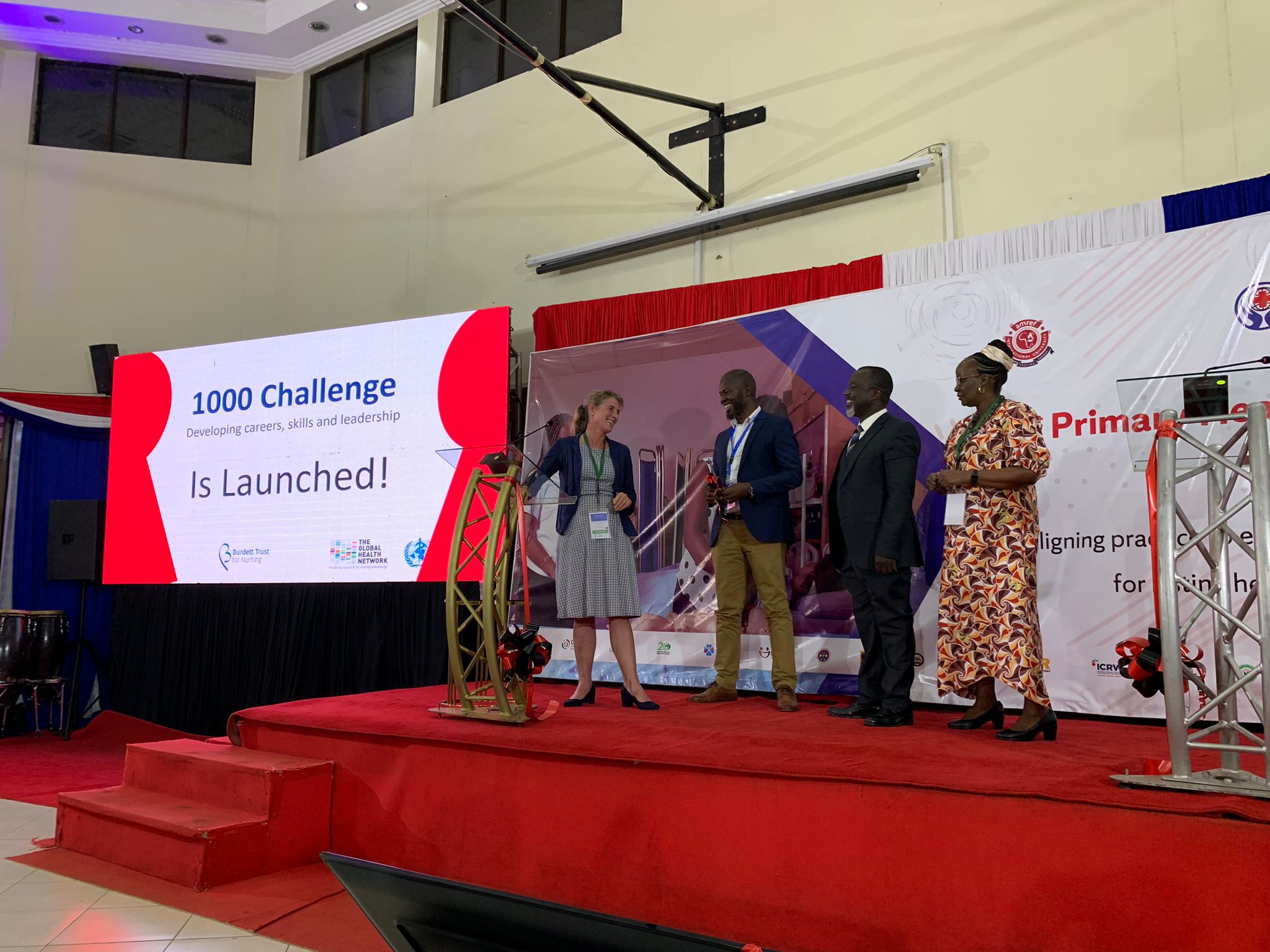
The 1000 Challenge launched today at Amref International University (AMIU) 1st Primary Healthcare Congress in Nairobi, Kenya. Professor Trudie Lang, head of The Global Health Network announced the new initiative developed with the Nursing Now Challenge to help nurses, midwives, community health workers and allied health professionals set up pragmatic and achievable studies designed to solve challenging healthcare issues within their workplace. The study could be observational, social science (behavioural or practice), diagnostic, or clinical trials involving existing drugs, vaccines or non-pharmaceutical interventions.
The initiative was inaugurated with a ribbon-cutting ceremony with Samuel Muhula, Head of Learning and Impact at Amref Health Africa, Professor Joachim Osur, Vice chancellor Amref International University and Dr. Alice Lakati, Director of Research and Community Extension, Amref International University.
The 1000 Challenge will enable health professionals to ask locally important questions to generate evidence that can be taken up. The aim is to change practice and management to improve patient management, care, or treatment in a commitment to advance Health for All.
Through these studies, the partnership will serve to empower nurses, midwives, community health workers and allied health professionals and provide opportunities for leadership and career development, as well as equip them to improve health outcomes in their communities.
Both funded by The Burdett Trust for Nursing, the project brought Nursing Now Challenge and The Global Health Network together to recognise and tackle the stark inequity that currently exists in research – specifically who leads and who directly benefits from studies and their findings. It was acknowledged that nurses, midwives, and community health workers are frequently cited in work, but all too often not given the guidance or tools to lead research itself.
The 1000 Challenge will be embedded within The Global Health Network’s vast and trusted community of practice that runs research system strengthening programmes to integrate research within healthcare practice by facilitating workplace-based learning, local research support activities and professional development for research teams.
Nursing Now Challenge and The Global Health Network will provide help, support, training, tools and resources to each research team and support them in every step of the process including requesting institutional support, setting the question, running the study and taking the findings up into practice and sharing recommendations. This will be delivered through 1000 Challenge Hub which is hosted within The Global Health Network’s digital platform as part of a dynamic ecosystem of knowledge hubs that facilitate knowledge exchange and capacity development through a multitude of open-access health research resources including tools, guidelines, templates, methodologies, training courses, databases, webinars and workshops.
Programme Director of Nursing Now Challenge Professor Aisha Holloway states: “The opportunity for two existing programmes already funded by The Burdett Trust for Nursing to partner will be extremely powerful. The reach, scale, capacity, and capability to act in an agile manner is what is now required. Together we will be able to deliver research leadership education, providing a range of skills and opportunity for competency development, tailoring learning to meet need in care settings to benefit all. At Nursing Now Challenge we know our students and early career nurses and midwives are ready and willing to lead. Within this work, we are addressing six of the Sustainable Development Goals necessary to stay on course to achieve Health for All. There is no better time to take action in the year that the WHO celebrates its 75th birthday!”
Professor Trudie Lang, Director of The Global Health Network, University of Oxford said: “Practical and accessible interventions could tackle many of the most devastating and burdensome diseases of poverty across the globe if we had evidence to identify and prove these work. Nurses, midwives, and community health workers can and should be spotting these gaps and evaluating the solution, by leading the research and being recognised for this work. Typically, nurses are not given the mandate, support, and training to undertake their own health research studies. Therefore, this challenge is a fantastic opportunity to give these vital professionals a mechanism for taking up a leadership role, gaining visibility and learning new skills whilst simultaneously benefiting communities on a global scale from the important new findings these studies will deliver."
For more information and to take part visit: The 1,000 Challenge
Photo credit: Kay Kutschkau
Also By
- Nursing Now Challenge and The Global Health Network announce co-launch of groundbreaking global work: The 1,000 Challenge
- DNDi short film about new treatment for sleeping sickness awarded Grand Prix at inaugural WHO film festival
- Survey launched to establish what research funders should prioritise for COVID-19
-
I appreciate the great input in building Nurses and midwives capacity in Research and leadership.
Bravo to the Global Health Network.
-
Great initiative.
-
Hi to you all and Marry X Mass

Please Sign in (or Register) to view further.